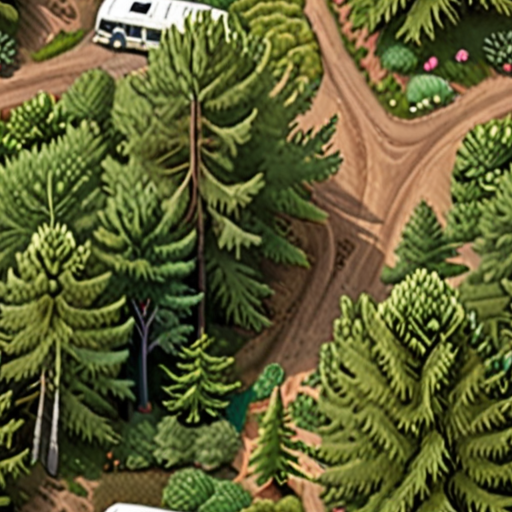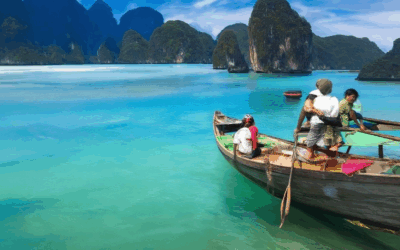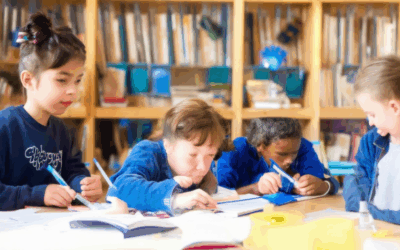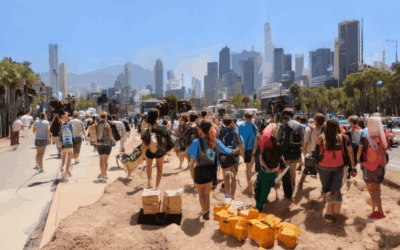Imagine immersing yourself in nature, disconnected from the distractions of modern life, and reconnecting with your surroundings and yourself.
Off-grid travel experiences provide a unique opportunity to challenge yourself, develop new skills, and forge unforgettable memories in some of the world’s most breathtaking landscapes.
From secluded wilderness retreats to remote island getaways, off-grid travel experiences cater to diverse tastes and preferences, allowing you to tailor your adventure to suit your needs and desires.
Whether you’re a seasoned traveler or embarking on your first off-grid journey, this article will guide you through the ins and outs of planning and executing a successful off-grid travel experience, highlighting the benefits, types, and essential considerations to keep in mind.

What Does Off the Grid Mean for Vacation?
When planning a vacation, you may come across the term “off the grid” which can be confusing, especially if you’re new to sustainable travel.
- The term off the grid actually means off the electricity grid, referring to a location that is self-sustaining by using solar, wind, hydro, or some other means of power.
- It also typically refers to having no internet service, allowing visitors to disconnect from the digital world and reconnect with nature.
In today’s fast-paced world, many travelers are seeking a break from technology and the hustle and bustle of daily life.
- Off-grid vacations offer a unique opportunity to unplug and recharge in a peaceful environment.
- Imagine waking up to the sound of birds chirping, spending your days hiking through lush forests, and enjoying stargazing at night.
For those interested in sustainable travel, off-grid destinations are becoming increasingly popular.
- These locations often rely on renewable energy sources, reducing their carbon footprint and promoting eco-friendliness.
- Additionally, off-grid vacations often support local communities and economies, contributing to the preservation of traditional ways of life.
Some popular off-grid destinations include:
- National parks and wildlife reserves
- Eco-lodges and sustainable resorts
- Remote islands and secluded beaches
When choosing an off-grid destination, consider factors such as accessibility, amenities, and activities offered.
- Look for places with easy access to transportation, accommodations, and dining options.
- Consider the types of activities available, such as hiking, fishing, or water sports.
By embracing off-grid vacations, travelers can experience the beauty of nature while supporting sustainable tourism practices.
Benefits of Off-Grid Vacations
- Reduced stress and anxiety
- Improved mental and physical health
- Increased sense of connection to nature
- Sustainable tourism practices
Popular Off-Grid Destinations
- National parks and wildlife reserves
- Eco-lodges and sustainable resorts
- Remote islands and secluded beaches
Getting Started with Off-Grid Travel
Research and plan carefully to ensure a smooth and enjoyable trip.
- Choose a reputable tour operator or accommodation provider.
- Pack accordingly, considering the climate, terrain, and activities.
- Be respectful of local environments and cultures.
Exploring Different Types of Travel Experiences
I’ve had the privilege of embarking on various types of travel experiences throughout my life, each offering unique perspectives and opportunities for growth.
-
Cultural Immersion
Immerse yourself in local customs, traditions, and ways of life by staying with host families, participating in homestays, or volunteering for community projects.
This type of travel allows you to develop a deeper understanding of the culture and people, fostering meaningful connections and memories.
For example, I spent a month living with a family in rural Japan, learning about their daily routines, trying new foods, and participating in traditional festivals.
-
Adventure Travel
Get your adrenaline pumping by exploring the great outdoors through activities like hiking, rock climbing, white-water rafting, or skiing.
From trekking through the Himalayas to island-hopping in Greece, adventure travel offers endless possibilities for thrill-seekers and nature lovers alike.
I once went skydiving in New Zealand, taking in breathtaking views of the landscape while pushing past my comfort zone.
-
Sustainable Tourism
Travel responsibly by choosing eco-lodges, supporting local businesses, and reducing your carbon footprint.
This approach not only benefits the environment but also contributes to the economic development of local communities.
I stayed at an eco-lodge in Costa Rica, which supported reforestation efforts and provided educational programs on sustainable living.
-
Food and Wine Travel
Indulge in local cuisine, wine tastings, and cooking classes to discover the rich flavors and aromas of different regions.
From sampling street food in Bangkok to attending wine harvest festivals in Tuscany, food and wine travel is a sensory delight.
I took a cooking class in Italy, learning the art of making pasta and pizza from scratch.
-
Volunteer Travel
Combine travel with giving back by participating in conservation projects, teaching English, or assisting with disaster relief efforts.
This type of travel not only makes a positive impact but also provides opportunities for personal growth and networking.
I volunteered at an animal sanctuary in South Africa, helping care for rescued wildlife and learning about conservation efforts.
-
Road Trips
Hit the open road and explore scenic routes, national parks, and hidden gems by car or motorcycle.
From driving along the Pacific Coast Highway to exploring the American Southwest, road trips offer flexibility and freedom.
I embarked on a road trip across the United States, visiting iconic landmarks, trying local cuisine, and enjoying the stunning scenery.
-
City Breaks
Discover urban landscapes, museums, galleries, and cultural events by exploring cities around the world.
From strolling through Parisian streets to exploring Tokyo’s neon district, city breaks offer a wealth of experiences.
I visited New York City, taking in the bright lights, iconic landmarks, and diverse neighborhoods.

Getting Good Travel Experience
I’ve learned that getting a good travel experience involves planning ahead, staying informed about my destination, packing light, staying flexible, trying local cuisine, and respecting the environment.
- Plan ahead by researching your destination, booking accommodations and flights in advance, and making a rough itinerary to ensure you have enough time for activities and relaxation.
- Stay informed about your destination by reading travel guides, talking to fellow travelers, and checking government advisories to stay up-to-date on safety and health concerns.
- Pack light by bringing only essentials, choosing multi-purpose items, and considering the dress code and climate of your destination.
- Stay flexible by leaving room for spontaneity, being open-minded to new experiences, and having a backup plan in case things don’t go as expected.
- Try local cuisine by exploring street food, visiting markets, and asking locals for recommendations to experience authentic flavors and dishes.
- Respect the environment by reducing plastic usage, conserving water, and supporting eco-friendly initiatives to minimize your impact on the local ecosystem.
Embracing the Unexpected
Traveling can be unpredictable, and embracing the unexpected is crucial to having a good travel experience.
- Be prepared for delays, cancellations, or changes in plans by staying calm, communicating with your airline or tour operator, and finding alternative solutions.
- Take advantage of unexpected opportunities by being open to new experiences, meeting new people, and trying new activities.
- Learn to adapt to changing circumstances by being flexible, patient, and resourceful to ensure a smooth and enjoyable trip.
Staying Healthy and Safe
Staying healthy and safe while traveling requires taking necessary precautions, being aware of potential risks, and knowing what to do in case of an emergency.
- Get vaccinated before traveling to protect yourself against diseases prevalent in your destination.
- Take necessary medications and bring essential medical supplies to ensure you’re prepared for any situation.
- Research local healthcare options, know the nearest hospital or clinic, and carry important phone numbers and documents with you.
Capturing Memories
Capturing memories during your travels can be done through various means, from photography to journaling, and helps to preserve the experience and reflect on it later.
- Bring a camera or smartphone to capture moments, landscapes, and cultural events to document your journey.
- Keep a travel journal to record thoughts, feelings, and observations, and to reflect on your experiences.
- Share your experiences with friends and family through social media, emails, or letters to keep them updated and involved.
Being Grateful
Being grateful for the opportunity to travel and experiencing new cultures, people, and places can enrich your life and broaden your perspective.
- Reflect on the experiences you’ve had, the people you’ve met, and the lessons you’ve learned to appreciate the value of travel.
- Show appreciation for the support of loved ones, colleagues, and sponsors who made your trip possible.
- Share your gratitude with others by writing reviews, sharing photos, or recommending destinations to inspire others to travel.

What Experience Do You Gain From Travel?
As I reflect on my own travels, I realize that the experiences and lessons learned have been invaluable.
- I’ve developed new skills, such as language skills, cultural awareness, and problem-solving skills.
- I’ve learned about new things, such as history, geography, and religion.
- I’ve challenged myself and grown as a person.
Travel has allowed me to step out of my comfort zone and adapt to unfamiliar situations, which has helped me become more resilient and confident.
The Benefits of Travel
Some of the benefits of travel include:
- Cultural Immersion : Living among locals and immersing myself in their customs and traditions has broadened my perspective and taught me valuable lessons about tolerance and understanding.
- : Learning a new language has opened doors to new opportunities and connections, allowing me to communicate effectively with people from diverse backgrounds.
- Personal Growth : Overcoming challenges and pushing beyond my limits has helped me develop self-awareness, self-reliance, and a sense of accomplishment.
How Travel Can Transform You
Travel has the power to transform you in profound ways, helping you:
- Develop Empathy : Experiencing different cultures and meeting people from various walks of life has taught me to appreciate the diversity of human experiences and perspectives.
- Become More Open-Minded : Stepping outside my comfort zone has helped me become more receptive to new ideas, experiences, and ways of thinking.
- Discover New Passions : Exploring new places and trying new activities has introduced me to new hobbies and interests, enriching my life and sense of purpose.
Conclusion
Travel has been a transformative experience that has shaped me into the person I am today.
Writing About My Travel Experience
I’m excited to share my travel experiences with you through Inxchan, a platform that inspires readers to explore global adventures with a purpose.
- Know the General Rules of Travel Writing
- When writing about my travels, I always keep in mind that the content is for Inxchan, a travel and volunteer-focused blog that emphasizes personal growth, cultural understanding, and impactful travel.
- I make sure to mention competitors when applicable and remain neutral about them, linking to them when necessary.
- However, I never put a competitor above the brand I am writing for, especially when it comes to the term “best.”
- I strive to represent the business I am writing for professionally and avoid putting competitors over them.
- It’s okay to list more than one competitor as the best, as long as I remain true to the brand’s values and mission.
- Focus on Quality Content
- I aim to create high-quality content that showcases my travel experiences in a unique and engaging way.
- I use descriptive language to paint a picture of the places I’ve visited and the people I’ve met.
- I also include helpful tips and advice for fellow travelers, drawing from my own experiences and research.
- By focusing on quality content, I can establish myself as an authority in the travel writing niche and attract a loyal following.
- Use Strategic Keywords and Inner Linking
- I incorporate relevant keywords into my content to improve its visibility in search engine results.
- I use inner linking strategically to connect related articles and guide readers through the content.
- This helps to enhance the user experience and keeps readers engaged with the material.
- By using keywords and inner linking effectively, I can increase the chances of my content ranking highly in search engine results.
- Maintain a Natural Flow and Readability
- I prioritize maintaining a natural flow and readability in my content, avoiding unnecessary links and focusing on the narrative.
- I use short paragraphs and concise sentences to make the content easy to read and understand.
- I also include images and videos to break up the text and provide visual interest.
- By prioritizing readability, I can engage readers and keep them interested in the content.
- Follow Best Practices for SEO
- I adhere to best practices for SEO, including using header tags, meta descriptions, and optimizing images.
- I also ensure that my content is mobile-friendly and loads quickly, as these factors play a significant role in search engine rankings.
- By following best practices for SEO, I can improve the visibility and credibility of my content.

Skills Gained from Traveling
I’ve had the privilege of traveling extensively, and I can confidently say that it has been one of the most rewarding experiences of my life.
-
Cultural Immersion
Traveling allows you to immerse yourself in different cultures, learn about their customs, traditions, and ways of life. By doing so, you develop a deeper appreciation for diversity and become more open-minded.
-
Language Skills
When traveling, you’re often forced to communicate with locals who speak different languages. This helps you develop your language skills, which can be incredibly valuable in both personal and professional settings.
-
Problem-Solving
Traveling often involves navigating unfamiliar environments, dealing with unexpected situations, and finding creative solutions to problems. These skills are transferable to many areas of life and can help you become a more resourceful and adaptable individual.
-
Independence
Traveling requires independence, self-reliance, and a willingness to take risks. By pushing yourself outside of your comfort zone, you develop confidence in your ability to handle challenging situations.
-
Networking
Traveling provides opportunities to meet people from diverse backgrounds, industries, and professions. Building relationships with fellow travelers, locals, and industry experts can lead to valuable connections and collaborations.
-
Resilience
Traveling can be unpredictable, and things don’t always go as planned. Developing resilience and learning to cope with setbacks and failures is essential for success in both personal and professional endeavors.
-
Flexibility
Traveling requires flexibility, adaptability, and a willingness to adjust plans according to changing circumstances. These skills are highly valued in today’s fast-paced, dynamic work environment.
-
Self-Awareness
Traveling allows you to reflect on your values, goals, and priorities. Through introspection and self-reflection, you gain a deeper understanding of yourself and what drives you.
-
Time Management
Traveling often involves juggling multiple tasks, responsibilities, and deadlines. Developing effective time management skills helps you stay organized, focused, and productive.
-
Leadership
Traveling can involve leading groups, making decisions, and taking charge of situations. These leadership skills are transferable to various contexts, including work, volunteering, and community involvement.
-
Personal Growth
Traveling offers opportunities for personal growth, self-improvement, and transformation. By stepping out of your comfort zone and embracing new experiences, you develop a greater sense of purpose and fulfillment.
Conclusion
Traveling is a powerful catalyst for personal and professional growth. By developing skills such as cultural immersion, language skills, problem-solving, independence, networking, resilience, flexibility, self-awareness, time management, leadership, and personal growth, you’ll become a more well-rounded, confident, and capable individual. Whether you’re looking to enhance your career prospects, deepen your understanding of the world, or simply challenge yourself, traveling is an investment worth making.




0 Comments